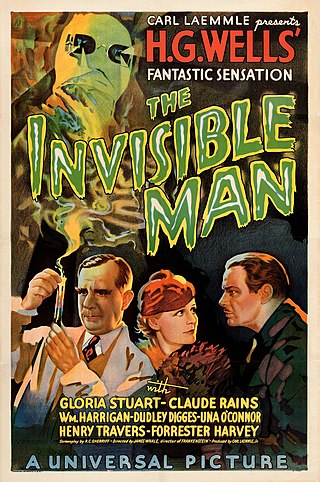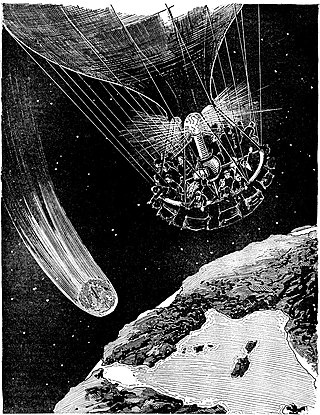Related Research Articles

Jerry Eugene Pournelle was an American scientist in the area of operations research and human factors research, a science fiction writer, essayist, journalist, and one of the first bloggers. In the 1960s and early 1970s, he worked in the aerospace industry, but eventually focused on his writing career. In an obituary in Gizmodo, he was described as "a tireless ambassador for the future."

Laurence van Cott Niven is an American science fiction writer. His 1970 novel Ringworld won the Hugo, Locus, Ditmar, and Nebula awards. With Jerry Pournelle he wrote The Mote in God's Eye (1974) and Lucifer's Hammer (1977). The Science Fiction and Fantasy Writers of America gave him the 2015 Damon Knight Memorial Grand Master Award.

The Invisible Man is a science fiction novel by British writer H. G. Wells. Originally serialised in Pearson's Weekly in 1897, it was published as a novel the same year. The Invisible Man to whom the title refers is Griffin, a scientist who has devoted himself to research into optics and who invents a way to change a body's refractive index to that of air so that it neither absorbs nor reflects light. He carries out this procedure on himself and renders himself invisible, but fails in his attempt to reverse it. A practitioner of random and irresponsible violence, Griffin has become an iconic character in horror fiction.

Charles Sheffield, was an English-born mathematician, physicist and science-fiction writer who served as a President of the Science Fiction and Fantasy Writers of America and of the American Astronautical Society.
This article contains information about the literary events and publications of 1933.
Steven Barnes is an American science fiction, fantasy, and mystery writer. He has written novels, short fiction, screen plays for television, scripts for comic books, animation, newspaper copy, and magazine articles.

The brothers Arkady Natanovich Strugatsky and Boris Natanovich Strugatsky were Soviet-Russian science-fiction authors who collaborated through most of their careers.

Roadside Picnic is a philosophical science fiction novel by Soviet-Russian authors Arkady and Boris Strugatsky, written in 1971 and published in 1972. It is the brothers' most popular and most widely translated novel outside the former Soviet Union. As of 2003, Boris Strugatsky counted 55 publications of Roadside Picnic in 22 countries.

The Invisible Man is a 1933 American science fiction horror film directed by James Whale based on H. G. Wells's 1897 novel, The Invisible Man, produced by Universal Pictures, and starring Gloria Stuart, Claude Rains and William Harrigan. The film involves a Dr. Jack Griffin (Rains) who is covered in bandages and has his eyes obscured by dark glasses, the result of a secret experiment that makes him invisible, taking lodging in the village of Iping. Never leaving his quarters, the stranger demands that the staff leave him completely alone until his landlady and the villagers discover he is invisible. Griffin goes to the house of his colleague, Dr. Kemp and tells him of his plans to create a reign of terror. His fiancée Flora Cranley, the daughter of his employer Dr. Cranley, soon learn that Griffin's discovery has driven him insane, leading him to prove his superiority over other people by performing harmless pranks at first and eventually turning to murder.

The Waves Extinguish the Wind is a 1985 science fiction novel by Soviet writers Boris and Arkady Strugatsky, set in the Noon Universe. The book is narrated by Maxim Kammerer, and tells the story of The Great Revelation.
John Francis Carr is an American science fiction editor and writer as well as the executor of the literary estate of H. Beam Piper.
The Aelita Award is an award for science fiction writers founded by the Union of Writers of Russia and "Uralsky Sledopyt Magazine" in 1981. It was named after the classic Russian science fiction novel Aelita. The prize is awarded during the Aelita, a Soviet/Russian science fiction fandom convention.

Comets have appeared in works of fiction since at least the 1830s. They primarily appear in science fiction as literal objects, but also make occasional symbolical appearances in other genres. In keeping with their traditional cultural associations as omens, they often threaten destruction to Earth. This commonly comes in the form of looming impact events, and occasionally through more novel means such as affecting Earth's atmosphere in different ways. In other stories, humans seek out and visit comets for purposes of research or resource extraction. Comets are inhabited by various forms of life ranging from microbes to vampires in different depictions, and are themselves living beings in some stories.
Timescape Books was a science fiction line from Pocket Books operating from 1981 to 1985. Pocket Books is an imprint of Simon & Schuster.
A list of works by, or about, the American science fiction author Larry Niven.
The year 1925 was marked, in science fiction, by the following events.
The year 1929 was marked, in science fiction, by the following events.
The year 1937 was marked, in science fiction, by the following events.
The year 2012 is marked, in science fiction, by the following events.

The Invisible Man is a film series by Universal Pictures. The series consists of The Invisible Man, The Invisible Man Returns, The Invisible Woman, Invisible Agent, The Invisible Man's Revenge and Abbott and Costello Meet the Invisible Man. The film series borrows elements from H. G. Wells's novel The Invisible Man, but it focuses primarily on the idea of a serum that causes someone to go invisible and its side-effects.
References
- ↑ "Boris Strugatsky". BFI. Archived from the original on June 21, 2017. Retrieved 9 April 2019.
- ↑ "Authors : Whittemore, Edward : SFE : Science Fiction Encyclopedia". www.sf-encyclopedia.com. Retrieved 9 April 2019.
- ↑ Genzlinger, Neil (15 September 2017). "Jerry Pournelle, Science Fiction Novelist and Computer Guide, Dies at 84". The New York Times. Retrieved 9 April 2019.
- ↑ "Alain Dorémieux (1933-1998)". data.bnf.fr. Retrieved 9 April 2019.
- ↑ Funke, Jana; Grove, Jen (2018). Sculpture, Sexuality and History: Encounters in Literature, Culture and the Arts from the Eighteenth Century to the Present. Springer. p. 94. ISBN 9783319958408.
- ↑ Davin, Eric Leif (2006). Partners in Wonder: Women and the Birth of Science Fiction, 1926-1965 . Lexington Books. p. 222. ISBN 9780739112670.
- ↑ "The Invisible Man | film by Whale [1933]". Encyclopedia Britannica. Retrieved 9 April 2019.
- ↑ "Der TUNNEL (1933)". BFI. Archived from the original on October 19, 2018. Retrieved 9 April 2019.